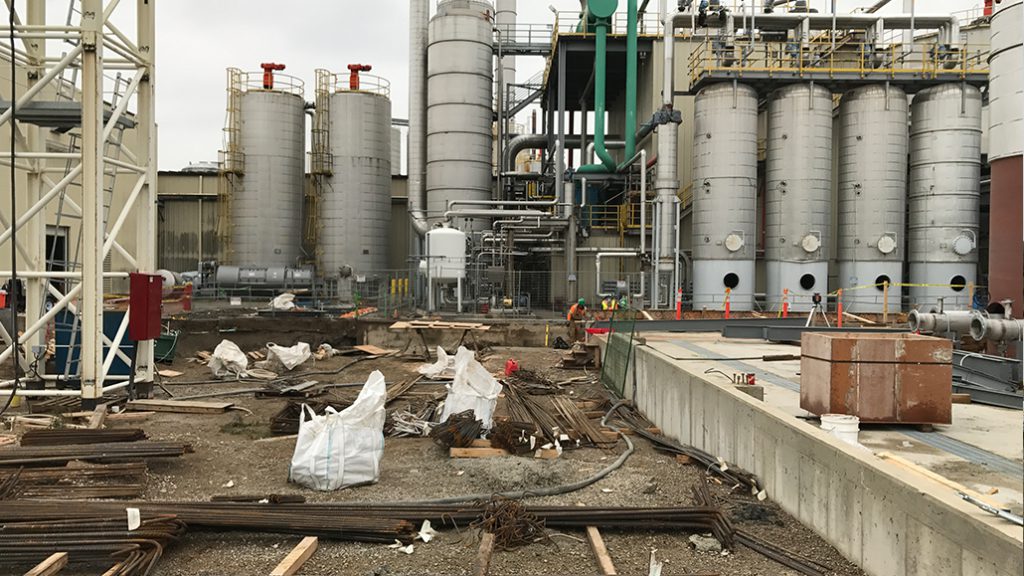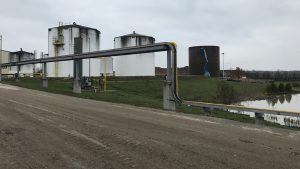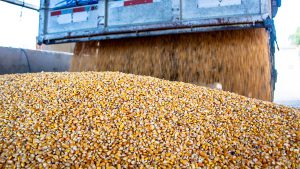Looking to the future
EXPANSION AT IGPC ETHANOL INC.

AS THE LARGEST corn producer in Canada, it’s not surprising that Ontario is also the country’s leading ethanol producer. Six facilities, operated by Greenfield Ethanol Inc., IGPC Ethanol Inc., Kawartha Ethanol, and Suncor, produce more than one billion litres of fuel ethanol every year.
IGPC Ethanol Inc. in Aylmer, Ontario, is currently undergoing a $120 million expansion to double its production capacity. When construction is complete in November 2018, it will be able to produce at least 400 million litres of fuel ethanol per year.
“When we decided to expand, we reviewed the market and we knew there was demand for domestic product. Ontario is a net importer of U.S. ethanol,” says Jim Grey, chief executive officer of IGPC. “While there were strong signals an increased mandate for biofuels would be forthcoming in the province, we didn’t make that assumption in our financial analysis.”
GOVERNMENT MANDATES
Ontario’s Ethanol in Gasoline Regulation currently requires at least five per cent ethanol in gas. An increase in the amount of ethanol (10% by 2020) used in regular grade gasoline is being proposed in an amendment to the regulation as part of the broader provincial government strategy to reduce greenhouse gas emissions and meet the goals of their Climate Change Action Plan (see sidebar on page 30). The federal government is also creating a Clean Fuels Standard aimed at reducing emissions within the transportation sector through carbon thresholds.
“Ethanol is one of the many tools that can be used to meet government targets for GHG reductions in the transportation sector,” notes Grey. “Not too many industries can say they will stimulate economic activity while fighting climate change.”
According to a study conducted by the Doyletech Corporation that was prepared for Renewable Industries Canada, an increase in ethanol production to meet a 10 per cent mandate will lead to an ongoing economic benefit of $638 million annually and 264 jobs across the sector.
GROWTH
The economic impact of growth within the renewable fuels sector is already being seen in Aylmer. When IGPC opened 10 years ago, they had 38 employees; once the expansion is complete, close to 100 people will work on site (including workers involved in by-product production). The influx of construction workers has even created a trickle effect within the local economy with new businesses opening up nearby.
During construction, IGPC is still in full operation processing approximately 50,000 bushels of corn per day. Grain trucks make deliveries as other trucks load up with dried distillers’ grains and flatbeds haul in large sheets of metal and rebar.
“We have to keep the trucks moving, but we also have a serious focus on safety,” says Kevin Norton, IGPC’s director of operations. “It’s a coordinated effort to make sure everyone is aware of what’s happening. We’ve added the dangers of an active construction site to those that normally exist within an ethanol facility.”
Since work began in May 2017, additions have been built onto existing buildings, new storage tanks have been put up, a new cooling tower has been added, and new electrical and plumbing has been installed.
The expansion at IGPC is aimed at creating operational efficiencies. The number of fermenters is being doubled from four to eight to reduce the amount of time it will take to complete production cycles. An expanded wet pad and a third dryer will allow designated dryers for wet and dry products instead of switching the units between the two processes. A cogeneration power facility will capture waste thermal heat for re-use.
BY-PRODUCTS
The expansion at IGPC will also increase its output of dried distillers’ grains (DDGs) and carbon dioxide. IGPC uses an industry first Fibre Separation Technology™ which allows them to provide two different DDGs products; one with 43% protein that doesn’t contain fibre or syrup and the other with 28% protein. Grey says they are investigating export options for their DDGs to Southeast Asia and China in addition to continuing to supply local farmers with the feed.
In a partnership with Air Liquide, carbon dioxide (CO2) that is produced during the fermentation part of the production process will be captured and shipped out to a variety of consumers including greenhouses.
“It was always our intent to capture the CO2 as another by-product. Air Liquide has installed 120 foot long tanks which have created seven days of storage on site for compressed, liquefied CO2” explains Norton. “They will handle the purification and shipping process.”

LOOKING TO THE FUTURE
With the increase in production, IGPC will be looking to source more corn from local farmers (the company partners with Thompsons to buy all of their corn). Grey says they haven’t secured that additional supply yet, but they will do so in early 2018, and he isn’t worried about it. “We know there will be enough corn available given the increase in yields that have been achieved in recent years.”
Norton says they are improving their process for deliveries to ensure that they are a preferred delivery point.
“We’ve considered the impact of moving 200 to 225 trucks a day through the new facility,” says Norton. “We don’t want drivers to be left waiting for long periods of time. An automated system will help us with security checks and processing trucks through the weigh scales as quickly as possible.”
The increase in production at IGPC is timed well to take advantage of the expanding market for ethanol. Grey says they are ahead of the curve a little bit but that speaks to their goal of being a leader in the production of renewable energy. “We believe in the future growth of the ethanol industry, as well as the undeniable consumer and environmental benefits that accrue from increased ethanol production and usage.”
ONTARIO’S FUEL STANDARD
In January 2017, the Ontario Ministry of the Environment and Climate Change issued a discussion paper entitled “Developing a Modern Renewable Fuel Standard For Gasoline in Ontario” as part of their Climate Change Action Plan. Following the public consultation period and review, a decision was posted on the Environmental Registry in November 2017 which proposed an amendment to the existing renewable fuel regulations to increase ethanol blending requirements, improve the environmental performance of fuels, and recognize emerging clean fuel technologies.
Among the proposed amendments to the Ethanol in Gasoline regulation is a requirement for gasoline suppliers to maintain an average of at least 10% ethanol in regular grade gasoline (88 octane or less), by volume per calendar year starting in 2020.
The current ethanol mandate is five per cent.
According to the Ministry, “Proposed amendments are intended to work with the expected federal Clean Fuels Standard, ensuring GHG reductions take place in Ontario and Ontario’s Climate Change Action Plan goals are supported. The proposed amendments would support innovation in emerging technologies.”
The government’s proposed amendments to the Ethanol in Gasoline regulation have been posted for review and comment until January 23, 2018. Grain Farmers of Ontario will be making a submission to support the increased use of ethanol.
For more information, go to www.ebr.gov.on.ca and search for EBR Registry Number: 013-1929. •












